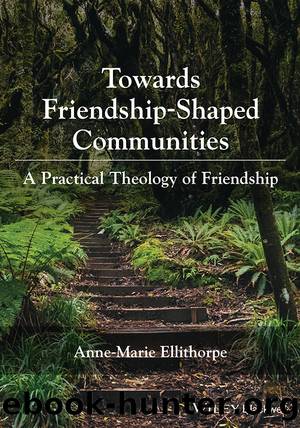Towards Friendship-Shaped Communities by Anne-Marie Ellithorpe

Author:Anne-Marie Ellithorpe [Ellithorpe, Anne-Marie]
Language: eng
Format: epub
ISBN: 9781119756965
Published: 2022-03-29T12:15:52+00:00
Summary
Several common themes that can inform a practical theology of friendship have emerged in this chapter, including the interrelationship of friendship and community. Friends need to be sensitive to the needs of the communities within which they are nurtured; conversation amongst friends may need to be put aside to meet community needs. Nevertheless, friendship and community are not opposed to one another. Rather, friendships may serve to strengthen community. While civic friendship is inherent to the covenantal community encouraged by the Hebrew Scriptures (see Chapter 3), it is the writings of the classical philosophers that introduce the terminology of civic friendship and explicitly consider the inter-relationship between friendship and justice. Civic friendship retains integral aspects of personal friendships, including mutual awareness, goodwill, and action, in the concern of citizens for their broader community.
Friendship emerges through the writings of key classical philosophers as essential to life â for men at least. Despite classical qualms about friendship between women and men that have endured into modern times, potential for friendship between marriage partners is acknowledged. Sexist presumptions must be rejected. Nevertheless, as demonstrated in the writings of contemporary philosophers, including Sibyl Schwarzenbach, there is potential to draw on the work of the classical philosophers in ways that are inclusive.
Characteristics of classical friendship tend to include an emphasis on mutuality and equality, along with wishing the other well for the sake of the other. Shared goodness and virtue are valued. However, the philosophers of antiquity emphasize equality of virtue, rather than the reciprocal desire to establish and maintain such equality.76 While Aristotle attempts to restrict friendship to consciously mutual relationships, Socrates and Plato acknowledge that friendships may not always (or initially) be consciously so. While parenting is not a focus of Aristotleâs writings (nor Ciceroâs nor Platoâs) it is a relationship that exhibits at least some characteristics of friendship.
The ancient philosophers discounted the potential for friendship with god, or the gods. However, in Christian friendship traditions (admittedly with different understandings of the divine) friendship with God emerges as the ultimate human destiny. Teresa recognizes that God abandons dignity and status in the pursuit of friendship. Aquinas identifies grace as Godâs gift bringing the divine life into each personâs heart. Friendship that is Christocentric, that is, that finds its model in Christ (the true friend), is a path towards the fullness of life in God. In and through friendship with Christ, by grace and by the Spirit, humans are made friends of God. Friends are to seek God by living in Christ and shaping their lives according to Christ.
Download
This site does not store any files on its server. We only index and link to content provided by other sites. Please contact the content providers to delete copyright contents if any and email us, we'll remove relevant links or contents immediately.
Never by Ken Follett(2878)
The Man Who Died Twice by Richard Osman(2296)
Machine Learning at Scale with H2O by Gregory Keys | David Whiting(2283)
Fairy Tale by Stephen King(2063)
Will by Will Smith(2040)
Reminders of Him: A Novel by Colleen Hoover(1877)
Rationality by Steven Pinker(1764)
The Stranger in the Lifeboat by Mitch Albom(1531)
The Becoming by Nora Roberts(1330)
Friends, Lovers, and the Big Terrible Thing by Matthew Perry(1326)
New Morning Mercies: A Daily Gospel Devotional by Paul David Tripp(1320)
A Short History of War by Jeremy Black(1299)
HBR's 10 Must Reads 2022 by Harvard Business Review(1253)
The Strength In Our Scars by Bianca Sparacino(1240)
The Fall of Babel by Josiah Bancroft(1233)
Can't Hurt Me: Master Your Mind and Defy the Odds - Clean Edition by David Goggins(1226)
515945210 by Unknown(1206)
Fear No Evil by James Patterson(1107)
Love on the Brain by Ali Hazelwood(1095)
